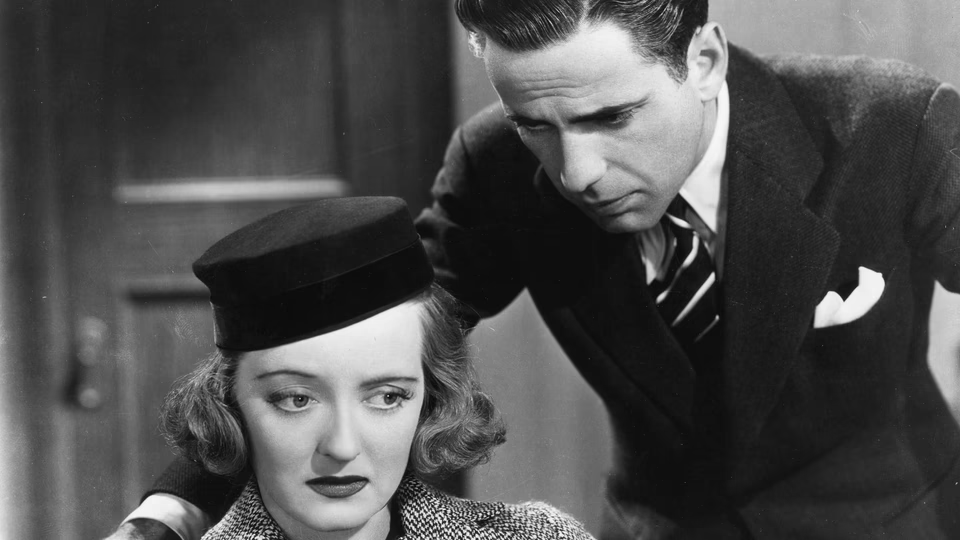Marked Woman

In her first film following her failed lawsuit to escape her contract, Bette Davis stars in a plot ripped from contemporary headlines.
Davis sued based on the type of roles Warners was assigning her. Her prior film, Satan Met a Lady, proved a tipping point. Said Davis in her autobiography, The Lonely Life:
I was so distressed by the whole tone of the script and the vapidity of my part that I marched up to Mr. Warner’s office and demanded that I be given work that was commensurate with my proven ability. I was promised wonderful things if only I would do this film. On its completion, my next assignment was the part of a female lumberjack in God’s Country and the Woman, a script so undistinguished and a part so stupid that I flatly refused to play it.
Though she lost the suit and returned to work at Warners, in a sense she won, as Marked Woman gives her the type of meaty part she’d craved. She plays a clip joint hostess working for a gangster named Vanning. When a patron turns up dead with her phone number in his pocket, an ambitious prosecutor played by Humphrey Bogart sees an opportunity to nail Vanning.
On the surface, it’s just another of the social outrage crime pictures Warners had been churning out throughout the 1930s, but the script surprises. Inspired by mobster Charles “Lucky” Luciano’s conviction on prostitution charges a year prior, it affords Davis’s character unexpected nuance. We see her coerced and threatened by Vanning, then witness Bogart and the cops haul her into a lineup on the flimsiest evidence with no regard for her feelings or reputation.
When she refuses to cooperate, Vanning has her beaten—an intense scene where we see nothing but hear everything. None of these scenes feel exploitative, just forthright. In that spirit, the film resists tacking on a love story between Davis and Bogart, instead ending with a haunting shot of Davis and the other hostesses disappearing into the city darkness—a resonating indictment of society’s willingness to use then disown them.
And that’s the crux of the film. Vanning uses Davis to extract money from suckers, Bogart uses Davis to convict Vanning. Nobody questions the ethics, it’s matter-of-fact. And lest you argue Davis and company should just quit their jobs, the script covers that too, with Davis explaining, “We’ve all tried this 12 and a half a week stuff. It’s no good. Living in furnished rooms, walking to work. Going hungry a couple of days a week so you can have some clothes to put on your back. I’ve had enough of that for the rest of my life.”
In scenes like these, you can feel Davis responding to the nuanced material. In her first scene with Bogart, her delivery conveys volumes of pent up rage with an intensity Bogart struggles to match. Later, in a hospital bed scene, she takes the opposite approach and underplays her delivery with quiet resignation.
But the film’s emotional stakes never rise to her performance. Aside from the hostesses, the players are all thin stereotypes included to propel the plot. Consider Jane Bryan as Davis’s naïve kid sister. Her contrived arrival exists so she’ll get mixed up with Vanning and force Davis to turn to Bogart for help.
Bogart’s character is just as thin. Despite his prominent second billing, his forgettable role amounts to fifteen minutes of screen time. He plays a generic tough kid turned honest G-man, a stereotype he’d reprise in next year’s Crime School.
As Vanning, Eduardo Ciannelli proves more memorable. His character is as one-dimensional as Bogart’s but Ciannelli gets some choice lines, like when he’s explaining to his slimy lawyer how, “I don’t make no deals with nobody. They make deals with me. All the time I’ve been that way, ever since I was that big. You think I care for money? All I care about is to make people do what I tell them.”
A better film would have dropped these gangster trappings and forced plotting. Davis proves a straightforward exposé of these girls’ lives can rivet. Barring that, giving Bogart’s character equal nuance by showcasing government corruption and backroom politics would have afforded his interactions with Davis genuine drama. Still, despite its shortcomings, Marked Woman’s feminist lens surprises for its time and proves Davis every bit the talent her lawsuit asserted.